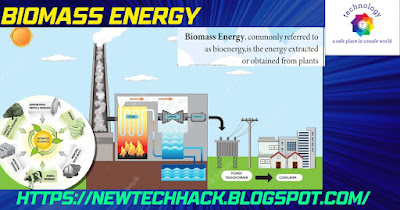Biomass energy
How Biomass Energy Works:
Biomass energy can be converted into various forms of usable energy through different processes:
- Combustion: Biomass materials, such as wood chips, agricultural residues, or dedicated energy crops, can be burned in boilers or furnaces to produce heat. This heat can be used directly for space heating, water heating, or industrial processes.
- Cogeneration: Cogeneration, also known as combined heat and power (CHP), involves the simultaneous generation of heat and electricity. Biomass fuels are burned to produce steam, which drives a turbine to generate electricity. The waste heat from this process is then captured and utilized for heating or other purposes, increasing overall energy efficiency.
- Anaerobic Digestion: Biomass materials, such as organic waste or animal manure, can undergo anaerobic digestion, a biological process where microorganisms break down the organic matter in the absence of oxygen. This process produces biogas, a mixture of methane and carbon dioxide. The biogas can be used directly as a fuel for heating or electricity generation, or it can be further processed to remove impurities and produce biomethane for use in vehicles or injection into the natural gas grid.
- Biochemical Conversion: Biomass materials can be converted into biofuels through biochemical processes such as fermentation or enzymatic reactions. For example, crops like corn or sugarcane can be fermented to produce ethanol, which can be blended with gasoline as a transportation fuel. Similarly, oils extracted from biomass can be converted into biodiesel.
Advantages of Biomass Energy:
1. Renewable and Carbon Neutral: Biomass energy is derived from organic matter, which can be continually replenished through sustainable management practices. When biomass is burned or converted, it releases carbon dioxide (CO2), but the CO2 emitted is roughly equal to the CO2 absorbed by the plants during their growth. Therefore, biomass energy is considered carbon neutral, as it does not contribute to net greenhouse gas emissions.
2. Utilization of Organic Waste: Biomass energy provides a means of utilizing organic waste materials that would otherwise end up in landfills, contributing to methane emissions. By converting these wastes into energy, biomass helps reduce environmental pollution and supports waste management strategies.
3. Versatility and Flexibility: Biomass resources are abundant and diverse, ranging from wood waste to agricultural residues and energy crops. This versatility allows for flexible deployment of biomass energy systems to suit different energy needs and regional contexts.
4. Baseload Power Generation: Biomass power plants can provide baseload power, meaning they can operate continuously and provide a stable supply of electricity. This characteristic makes them valuable for meeting the constant demand for power and enhancing grid stability.
5. Rural Development and Job Creation: Biomass energy production often occurs in rural areas, providing economic opportunities and job creation. It supports local agriculture, forestry, and related industries, contributing to regional development and reducing dependence on imported energy sources.
6. Energy Security: Biomass energy reduces dependence on fossil fuels, promoting energy security and reducing vulnerability to price fluctuations or supply disruptions. It provides a reliable and locally available source of energy.
Biomass Energy's Role in a Sustainable Energy Future:
Biomass energy plays an important role in the transition to a sustainable energy future. Its renewable nature, ability to utilize organic waste, and versatility make it a valuable component of the energy mix. Biomass energy can help reduce greenhouse gas emissions, promote waste management, support rural development, and enhance energy security.
However, it is crucial to ensure sustainable biomass production and utilization practices. Responsible biomass sourcing, avoiding the use of food crops for fuel production, and considering environmental and social impacts are essential. Sustainable biomass management practices, such as reforestation and regenerative agriculture, can further enhance the environmental benefits of biomass energy.
In conclusion, biomass energy offers a renewable, versatile, and carbon-neutral energy source. By harnessing organic matter, biomass energy contributes to a sustainable energy future while reducing waste, supporting local economies, and promoting energy independence. With careful management and ongoing technological advancements, biomass energy can continue to play a significant role in meeting our energy needs in an environmentally responsible manner.






No comments:
Post a Comment